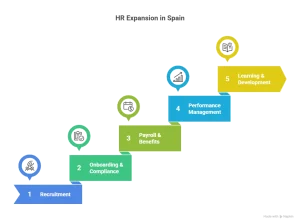Spain stands tall as a vibrant gateway to European markets. A strategic HR function becomes a powerful growth lever to start your business in Spain. It is not just a back‑office task, but it consists of recruiting talent to designing future‑ready workforce plans.
Mastering HR functions and best practices in the Spanish context ensures you stay compliant. You’ll be more competitive and culturally connected with strong HR in place.
We have written this guide to cover operational essentials and longer‑term transformational practices. We’ll show how outsourcing HR functions can simplify compliance and boost efficiency.
Understanding the Role of HR in Spanish Market Expansion
Expanding into Spain? HR should be one of your first calls. It’s more than just hiring people. But it’s about setting the right foundation for your business. When you enter a new market like Spain, you face unfamiliar rules. Not only this, but new cultures and different expectations also welcome you. That’s where HR steps in.
They help you navigate Spain’s labor laws. You can better manage contracts and avoid legal slip-ups. They also make sure your team feels supported and aligned with your goals. In short, HR connects your people strategy to your business strategy.
Spain has a unique work culture that is structured and often region-specific. Here, HR helps you adjust your policies so they feel local, not foreign. HR makes your expansion smoother, be it required for onboarding, payroll, or cultural fit.
Simply put, HR isn’t just support, it’s your strategic partner. Get it right from day one, and you’ll build a faster business in Spain, which is equally smart and more sustainable.
Expanding to Spain and Unsure How To Manage HR Functions Effectively?
HR as a Strategic Business Partner
Believe it or not, HR moves beyond administration and becomes a growth enabler. The best HR aligns hiring, retention, and development with your expansion vision. Their presence fuels leadership decisions with data‑driven talent strategy.
As you start a company in Spain, HR offers insight into salary benchmarks. You can experience their local skill pools and talent gaps. All these guide smarter expansion paths.
Navigating Spanish Labour Laws and Compliance
Spain’s employment rules are highly regulated. From contract types and working hours to termination regulations. Therefore, your HR is a proactive individual who makes sure every contract, working schedule, and dismissal follows Spain labour laws exactly.
They understand that for your business, compliance matters from day one. The same role is played by outsourced HR, but with more efficiency. Their functions play a critical role in protecting your company from fines. You’ll be saved from litigation and reputational risk by getting up‑to‑date legal expertise.
Cultural Adaptation and Employer Branding
Spanish workplace culture values a clear hierarchy. A team is built on direct communication and personal relationships. As a result, your HR drives adaptation with localizing policies, onboarding styles, and internal communication tone.
Their effort fit the local environment. An employer brand that resonates with Spanish candidates builds trust and attracts top talent.
Key HR Functions to Prioritize During Expansion
Building the right HR foundation can make or break your success when you’re about to expand in Spain. The process is not just about ticking off a checklist, but it’s about creating a local team that runs smoothly. One who stays compliant and feels connected. Spanish labor laws and cultural expectations shape how you need to approach HR.
Recruitment is the most important function that comes first. The next step is onboarding and compliance need serious attention. Payroll is another area. Spain runs on a detailed monthly payroll cycle. In Spain, performance management also looks a little different. Let’s find out how these and others key HR functions work in detail.
Recruitment and Talent Acquisition
Spain’s job market is competitive. Therefore, local talent often commands strong candidates. It’s up to you to recruit in‑house or use a local agency. Many companies choose an employer of record in Spain for fast hiring without setting up a local entity. An EOR lets you onboard Spanish employees legally. You can better manage contracts and pay local payroll with their support. In the meantime, accelerating market entry.
Onboarding and Compliance Management
To experience a smooth process, design a formal onboarding aligned with Spanish law. Collect essential employee documents like NIE (foreigner ID), Social Security numbers, and signed contracts. Compliance checklists and automation tools let you track milestones reliably.
Try to use HR management services that incorporate automated workflows. These services ensure nothing falls through the cracks and reduce legal exposure.
Payroll and Benefits Administration
Spanish payroll runs monthly. It includes employer and employee social contributions. Plus, it also involves healthcare, unemployment insurance, and other mandatory benefits. You have to be focused, as mistakes here carry penalties.
That’s why payroll services in Spain are among the most commonly outsourced functions of an HR department. They are specialists who ensure accurate contributions, tax filings, and payslips. So you stay compliant with evolving payroll rules.
Performance Management and Employee Engagement
During expansion, design KPIs that respect Spanish work styles. You should balance individual targets with team collaboration. Similarly, set clear goals and hold regular feedback sessions.
Especially as hybrid work grows and foster engagement using surveys and check‑ins. Spanish workers respond well to continuous recognition with transparent communication.
Learning, Development, and Upskilling
It’s high time to upskill your Spanish team with training. These trainings must be aligned with Spain’s digital and green transition. Offer compliance modules such as data protection, safety, tech skills, and leadership development. You can leverage LMS tools and micro‑learning to keep learning continuous and relevant.
Strategic HR Functions for Long‑Term Success
Is your team in Spain up and running? Now, it’s time to shift from setup to strategy. Long-term success means thinking beyond hiring and payroll. You need to plan for growth. Then, think about retention and change. That’s where strategic transformational HR functions come in.
Measuring HR Success: KPIs and Metrics
HR’s strategic value must be measurable. Setting up clear KPIs helps track progress and identify gaps.
Common HR KPIs in Spain include employee turnover rate, time-to-hire, absenteeism, training ROI, and compliance accuracy.
Use analytics dashboards to track these metrics regularly. Aligning HR KPIs with business outcomes-like revenue per employee or retention of critical talent-makes HR a true growth partner in your Spanish expansion.
Workforce Planning and Forecasting
Link your hiring roadmap to Spain’s economic outlook, forecast labor costs, inflation, and sector trends. Use analytics to predict talent shortages or surpluses and plan accordingly. This proactive approach helps you adapt to shifts before they hurt operations.
Career Pathing and Succession Planning
Offer mobility over time within Spain and across the EU. Map career paths so employees can see progression over time and move between the main functions of HR or locations. It increases retention. Data shows that employee benefits in Spain have clear progression and mobility drives loyalty.
Diversity, Equity, and Inclusion (DEI)
Spain increasingly mandates gender parity and inclusive practices. HR must craft policies promoting inclusion in recruitment, development, and leadership. Track metrics (gender ratios, diversity hiring), train managers on bias, and ensure inclusive culture practices.
Looking to Focus on Growth While Experts Manage HR Operations?
Should You Consider Outsourcing HR Functions in Spain?
Outsourcing functions in Spain can be a smart move if you’re new to the market. It’s also proved to be a worthwhile thing if you’re growing fast. Spanish labor laws are detailed. That’s why small mistakes can lead to fines. Local experts take that pressure off your internal team. You get peace of mind knowing things are being handled correctly from day one.
Outsourced HR functions and responsibilities also save time. You won’t need to build an entire in-house HR department right away. Providers can take over key tasks, including payroll, recruitment, onboarding, and benefits. This is especially helpful if you’re navigating employment rules across regions and want to avoid common HR mistakes that could slow down your growth.
Benefits of Outsourced HR Functions
By HR outsourcing functions, you’ll reduce operational load. Hiring a third party provides local compliance expertise. You’ll scale easily under their support. You can outsource to access specialized skills. This is beyond cost savings.
Outsourcing also frees your internal team to focus on strategic initiatives. It helps you navigate taxes in Spain, social security, and contract law seamlessly.
What HR Functions Can Be Outsourced?
Key areas include payroll, contracts and onboarding, local recruitment, compliance audits, and benefits administration. You can also outsource background checks and local employment documentation. Many providers help with notice period in the Spanish rules, managing probation, and termination clauses.
Choosing the Right HR Partner or EOR
Ask providers about GDPR data protection, legal coverage, and cultural fluency. Confirm they speak Spanish, understand regional differences, and can integrate with your systems. Query their automation capabilities, reporting tools, and whether they offer HR management services that suit scale and culture.
HR Risk Management and Data Protection
HR in Spain handles sensitive employee data-from contracts to payroll details. Therefore, compliance with the EU’s GDPR and Spain’s Data Protection Law (LOPDGDD) is non-negotiable.
HR departments must secure employee records, control access, and ensure third-party systems (including outsourced providers) maintain strict confidentiality.
Regular compliance audits, encrypted communication, and training staff on data privacy are essential steps in HR risk management. This prevents breaches and reinforces your company’s credibility in the Spanish market.
Best Practices for Managing HR in Spain
In Spain, managing HR takes more than just knowing the rules. It’s about understanding how people work. Plus, what they value, and how local systems operate. You can start by localizing your HR policies. Clear communication is also key.
Spanish work culture values direct and respectful dialogue. Well-being is another big priority. Spanish law places serious emphasis on health and safety. Lastly and most importantly, remember to stay compliant. You can use digital tools or local experts.
Localize Your HR Policies
Make leave policies according to Spanish laws. Adapt leave policies, bonus structures, and probation to Spanish norms. Honor regional holidays where relevant. Spain has national and autonomous-region-specific days. You can refer to the working hours in the Spanish regulations. It caps weekly hours and mandates breaks.
Focus on Communication and Feedback Culture
Connected to your HR feel hard? It’s not so difficult, you just need to encourage them for weekly 1:1s and regular team meetings. The more the engagement, the higher the outcomes.
To achieve it, use pulse surveys and digital tools to monitor engagement and sentiment. This perfectly works if you’re managing hybrid teams. The structured check‑ins build trust.
Prioritize Employee Well-being
Every individual looks out for something that addresses their well-being, and so does your HR. To gain their utmost attention, offer them mental health support, flexible schedules, and promote work‑life balance.
The good news? Spain places strict legal obligations on occupational health and safety. Make policies accordingly and make sure that your HR compliance includes training and prevention aligned with those rules.
Future HR Trends in Spain
HR in Spain is evolving fast. Flexible work policies, sustainability goals, and AI-powered talent management are shaping the next decade.
Businesses expanding into Spain should prepare for hybrid work models, skill-based hiring, and an increased focus on employee experience.
Embracing these trends early will help your organization stay resilient and attractive to Spain’s future-ready workforce.
Final Thoughts: Build HR as a Growth Engine, Not Just a Function
Spain’s HR is not just administrative. Their presence is foundational to scaling fast and thriving locally. Having strategic HR functions gives you the agility to attract local talent. Their efforts help you stay compliant and build a resilient culture. By outsourcing, you can achieve power efficiency and legal accuracy. However, keeping strategic oversight is important. This ensures alignment with your vision.
Using the EOR model? Then, Iberia EOR can handle payroll, contracts, and social security in Spain. They are specialists in their field. By leveraging their expertise, you can focus on growth.
Scaling Your Workforce Globally? Ensure Smooth HR Operations in Spain
FAQs
What Are the Main Functions of An HR Department?
There are many functions and responsibilities that HR performs. The main functions of HR department include the following:
- Recruitment
- Onboarding
- Compliance
- Payroll
- Performance management
- Employee relations
- Benefits
- Training and
- Development, and
- Administration
Which HR Functions Can Be Outsourced in Spain?
In Spain, businesses often outsource payroll services. Most businesses also outsource benefits administration, local recruitment, contract drafting, compliance audits, and onboarding administration.
How Do Spanish Labor Laws Impact HR Responsibilities?
Spain’s labor laws impose regulations on contracts, working hours, wages, termination notice and severance, probation, and holiday entitlements. Your HR must monitor and enforce these from day one.
What Are the Key HR Functions for Startups Entering Spain?
At the start, startups must focus on recruitment & talent acquisition. They also concentrate on onboarding & compliance, payroll & benefits administration, performance management, and initial training & development. They are all HR key functions.
How Does HR in Spain Differ from Other EU Countries?
Spain enforces stricter labor protection. The country has higher unemployment insurance contributions and region‑specific holidays. Their hierarchical culture and direct communication style also differ from more informal northern European norms.
Is Outsourcing HR Functions Cost‑effective for SMEs in Spain?
Outsourced HR functions offer legal compliance. This reduces operational burden and access to local expertise, and automation becomes easy. These factors drive cost‑efficiency and higher employee satisfaction.








